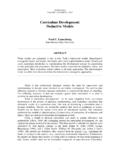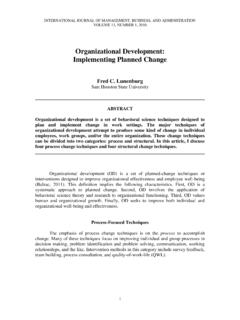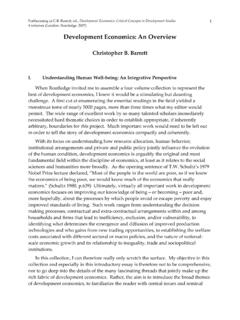Transcription of Understanding Military Culture: A Guide for Professional ...
1 497 The Professional Counselor Volume 4, Issue 5, Pages 497 504 2014 NBCC, Inc. and F. Cole, NCC, is a core faculty member in the school counseling program at Capella University. Correspondence may be addressed to PSC 809 Box 2515 FPO, AE 09626-0026, Rebekah F. ColeUnderstanding Military culture : A Guide for Professional School CounselorsSchool counselors must be knowledgeable about Military culture in order to help Military students and their families in a culturally competent manner. This article explores the nature of this unique culture , which is often unfamiliar to educators, including its language, hierarchy, sense of rules and regulations, self-expectations and self-sacrifice.
2 Specific suggestions, such as Professional development , self-examination and cultural immersion experiences, are provided so that Professional school counselors can increase their multicultural competence when working with this population. Finally, a case study illustrates the challenges associated with this culture and implications for school counselors in regard to increasing cultural competence when working with Military families are discussed. Keywords: Military , school counselors, families, culture , cultural competence The Professional school counselor is called to be a culturally competent practitioner (Holcomb-McCoy & Chen-Hayes, 2011). The American School Counselor Association (ASCA) position statement on cultural diversity emphasizes that school counselors should work for the success of all students from all cultures (ASCA, 2009).
3 Overall, school counselors should work to develop their self-awareness, knowledge and skills when it comes to working with students from diverse cultures (Remley & Herlihy, 2014). While other cultures have been explored in-depth in the Professional school counseling literature (Bradley, Johnson, Rawls, & Dodson-Sims, 2005; Byrd & Hays, 2012; Smith-Adcock, Daniels, Lee, Villalba, & Indelicato, 2006; Yeh, 2001), Military culture has not. Military culture is often unfamiliar to educators (Atuel, Esqueda, & Jacobson, 2011) who encounter Military students and their families regularly. Every school district in the United States has a child who is in some way connected with the Military , and 80% of all Military children attend public schools ( Military Child Education Coalition, 2014).
4 Therefore, it is essential for school counselors to be knowledgeable in navigating Military culture in order to support Military students and their family members in their schools (Luby, 2012; Department of Veterans Affairs, 2014). Overall, Military culture is a unique one (Luby, 2012) that presents distinctive challenges for its service members and their family members (Brown & Lettieri, 2008; Gooddale, Abb, & Moyer, 2012). While the Military itself can be viewed as a profession, the Military extends into the service members personal realms as well, affecting everyday lifestyle as well as the lifestyle of family members (Cozza & Lerner, 2013). Visible and Invisible Aspects of culture While strategies for working with Military children and their families during deployments have been investigated in the Professional literature (Allen & Staley, 2007; Cole, 2012; Robertson, 2007), this article The Professional Counselor\Volume 4, Issue 5498explores Military culture in order to help increase the school counselor s knowledge and awareness.
5 McAuliffe (2013), citing the metaphor of an iceberg, encouraged counselors to explore both the visible (above water) and invisible (below water) aspects of culture . culture that is most easily observed by outsiders, like the tip of an iceberg above water, is considered surface culture (McAuliffe, 2013). culture which is not observed by outsiders, like the larger part of the iceberg under the water, is considered either shallow culture or deep culture (McAuliffe, 2013). Shallow and deep culture correspond to more intense emotional experiences that may require extensive counseling services and support from the school counselor (The Iceberg Concept of culture , ; McAuliffe, 2013).
6 The present author seeks to inform the school counselor about the nature of surface, shallow and deep cultural aspects of the Military and provide implications for school counselor practice. In order to fully describe the nature of Military culture and its meaning for Military students and their family members, this article begins with an exploration of the surface-level aspects of Military culture (language, hierarchy, sense of rules and regulations) and then progressively explores the more emotionally intense shallow and deep aspects of Military culture (self-expectations and self-sacrifice). Finally, this article presents a case study that illustrates a Professional school counselor s culturally competent approach to working with a Military The first area of Military culture explored in this article is language, which is a visible, surface-level aspect of the Military lifestyle.
7 Encountering Military culture has been compared to navigating a foreign country, with its language an important aspect of this navigation (Huebner, 2013; National Military Family Association, 2014). Each of the five Military branches has its own set of terms and acronyms that relate to job title, position, location, services, time and resources for Military service members and their families ( Department of Veterans Affairs, 2014). Each Military branch also has its own set of moral codes (Kuehner, 2013) such as honor, courage and strength, which affect the service member s personal and Professional outlook (Luby, 2012). Learning and Understanding the language embedded in Military culture is essential for Professional school counselors in order to remove any communication barriers between the school counselor and family members ( Department of Veterans Affairs, 2014).
8 Hierarchy Hierarchy is another important visible, surface-level cultural aspect of the Military community. Rank and order are rigid in the Military , with service members expected to show respect for and compliance with their superiors (Martins & Lopes, 2012). This authoritarian structure may be mimicked in the Military family s home life as well (Hall, 2008). Overall, a service member s rank determines how much is earned financially (Huebner, 2013; Luby, 2012), how much education is provided, the level of access to resources (Hall, 2008) and the expected amount of responsibility ( Department of Defense, 2014). The service member s rank impacts the family members identity and sense of self, as the family identifies with their position in the Military community (Drummet, Coleman, & Cable, 2003).
9 School counselors should be aware that rank may influence not only the family s economic level, but their stress level as well, as it may determine the length and frequency of the service member s deployments (Luby, 2012). Sense of Rules and Regulations Moving deeper beyond the visible culture , Military culture embodies a strong sense of rules and restrictions, as there are clearly defined rules and expectations for Military service members and their families, including etiquette guidelines for spouses and children regarding dress, mannerisms and behavior in public ( Army War College, 2011). Military families are directed where to live, when they can travel and with whom they can socialize.
10 Additionally, higher ranking service members receive authority over the family s personal life. For The Professional Counselor\Volume 4, Issue 5499example, if a child is misbehaving in school or if the family is experiencing financial difficulties, the service member s superiors may become involved (Gooddale et al., 2012). Failure to abide by rules and expectations may result in expulsion from the Military (Kuehner, 2013). Self-Expectations Another invisible aspect of Military culture on a more intense emotional level are the expectations that Military service members and their families hold for themselves. Today s Military is a volunteer force, and service members freely join the Military lifestyle (Hall, 2008).



















